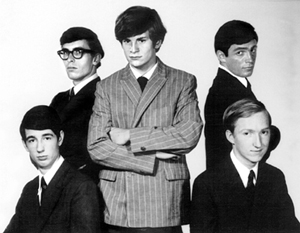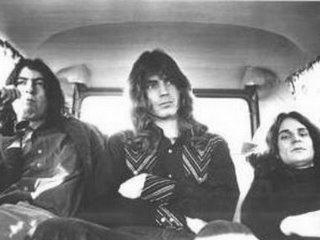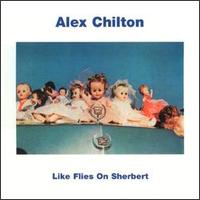It Came From Memphis Part 4
I sincerely apologize to those dedicated visitors to my blog for not updating this over the past week. I am using Blogger Beta, and it is having issues with text and picture placement. Also, Blogger seems to be down a lot for maintenance lately. So, if the text and spacing don't seem to look right on the page, it's because Blogger isn't displaying it properly. If anyone has any ideas about switching to another free blog service that works better, I'm all ears. Well, enough about that! Let's get on to the final installment of the It Came From Memphis series.
The Box Tops


While Chilton was honing his skills in Manhattan coffehouses, Chris Bell became the guitar player and background vocalist in a band called Rock City. The band named themselves after a tourist attraction in east Tennessee whose advertising on barn roofs read"SEE ROCK CITY". Despite this clever promotional move, the band was never recognized as a live act. Instead, they were essentially a studio band with a penchant for writing bittersweet love songs. Rock City was comprised of Tom Eubanks on lead vocals, Chris Bell on guitar and vocals, Jody Stephens on drums, Andy Hummell on bass and Terry Manning on keyboards. After Rock City, the band morphed into Ice Water and wrote a song called Feel with Bell on vocals. This song would later appear as the opening track on #1 Record. My Life Is Right and Try Again would also appear on Big Star's #1 Record, with Chilton assuming the lead singer role instead of Thomas Eubanks. Bell even asked Eubanks if he could take his name off the song credits for My Life Is Right and put Chilton's on it, because he wanted them to read "Bell, Chilton". Of course, Eubanks refused and and his name remains on there to this day.

Chilton and Bell grew up together in Memphis and played in a band called the Jinx in their early teens. However, they didn't cross paths again musically until the day Chilton stopped by Ardent studio on a weekend trip from Manhattan. Bell was working on Rock City tracks at the studio and Chilton was extremely impressed with the songs he heard. Chilton shared material that he was working on with Bell and moved back to Memphis when he realized the potential of writing songs with Bell and starting a rock-n-roll band. The two of them along with Jody Stephens and Andy Hummell formed Big Star in 1971. The band was close to being named Sweden Kreme (the fast food restaurant right next to the grocery chain called Big Star) but they chose Big Star instead. Who knows? With a catchy name like Sweden Kreme, Big Star could have been the next best thing. However, this was not to be.

The Box Tops

The Box Tops: The Letter and I Must Be the DevilI Must From: The Best of the Box Tops: Soul Deep [Arista, 1996]
Alex Chilton first struck an emotional chord with the nation after receiving critical acclaim for the Box Top's first single "The Letter" in 1967. "The Letter", produced and written by Dan Penn, became one of the highest-selling records of 1967. However, Chilton was only 16 years old when it was released, and he wasn't mentally prepared to cope with the overnight success and adulation that the Box Tops received. Session musicians were often replacing his original band in the studio, and he had little control over the music that the Box Tops released. Over the next couple years, Chilton was growing disheartened about not being able to write his own songs and he disliked the material that was handed to him by Dan Penn and other songwriters. He felt that he was merely a puppet and the music industry was pulling the strings. In 1970, at the age of 19, Chilton abruptly decided to quit the Box Tops to pursue his own creative interests as a solo artist and musician in Manhattan.
ROCK CITY

Rock City: Think It's Time to Say Goodbye, My Life Is Right and Try Again
From: S/T [ Lucky Seven Records, 2003]
While Chilton was honing his skills in Manhattan coffehouses, Chris Bell became the guitar player and background vocalist in a band called Rock City. The band named themselves after a tourist attraction in east Tennessee whose advertising on barn roofs read"SEE ROCK CITY". Despite this clever promotional move, the band was never recognized as a live act. Instead, they were essentially a studio band with a penchant for writing bittersweet love songs. Rock City was comprised of Tom Eubanks on lead vocals, Chris Bell on guitar and vocals, Jody Stephens on drums, Andy Hummell on bass and Terry Manning on keyboards. After Rock City, the band morphed into Ice Water and wrote a song called Feel with Bell on vocals. This song would later appear as the opening track on #1 Record. My Life Is Right and Try Again would also appear on Big Star's #1 Record, with Chilton assuming the lead singer role instead of Thomas Eubanks. Bell even asked Eubanks if he could take his name off the song credits for My Life Is Right and put Chilton's on it, because he wanted them to read "Bell, Chilton". Of course, Eubanks refused and and his name remains on there to this day.
Unfortunately, the eleven tracks culled from these sessions didn't receive a proper release when they were recorded in 1969. Instead, these tracks gathered dust in a tape storage facility in Memphis until they were recently unearthed and released on Lucky Seven Records in 2003.
BIG STAR
From: #1 Record [Ardent, 1972]
Big Star: O My Soul, Mod Lang, Back of a Car and September Gurls
From: Radio City [Ardent, 1974]
Chilton and Bell grew up together in Memphis and played in a band called the Jinx in their early teens. However, they didn't cross paths again musically until the day Chilton stopped by Ardent studio on a weekend trip from Manhattan. Bell was working on Rock City tracks at the studio and Chilton was extremely impressed with the songs he heard. Chilton shared material that he was working on with Bell and moved back to Memphis when he realized the potential of writing songs with Bell and starting a rock-n-roll band. The two of them along with Jody Stephens and Andy Hummell formed Big Star in 1971. The band was close to being named Sweden Kreme (the fast food restaurant right next to the grocery chain called Big Star) but they chose Big Star instead. Who knows? With a catchy name like Sweden Kreme, Big Star could have been the next best thing. However, this was not to be.
#1 Record
#1 Record was originally released in 1972 on Ardent, but it got lost in the shuffle due to a distribution snafu between Stax and Columbia Records. It was a critically acclaimed commercial failure, much to the chagrin of everyone who put so much time and effort into the record. However, from the unforgettable opening chords of Feel, you know this record is something special. Chilton's strained high-pitch vocals on the first verse recall Robert Plant on Communication Breakdown. The first verse immediately leads into a perfect multi-part harmony bridge from Chilton and Bell. Then, Chilton heats it up with a stunning guitar solo which then leads into an ecstatic mix of Stax-memphis horns and electric piano. The tempo increases in the last twenty-four seconds of the song as cascading guitars and a springy bassline bring it to a close. Thirteen alone has inspired many singer-songwriters from the past 30 years to pick up a guitar and play with their heart. Gentle acoustic guitars and heartfelt melodic vocals make this a truly gorgeous song. My Life Is Right conjures up fond memories of spending summer days with the girl that made you feel right inside. It's anthemic chorus, enthusiastic cymbal splashes and hooky counter-melodies make this song a crowd pleaser. I could obviously go on and on about this record, but please go out and buy this record to hear it for yourself.
Radio City
Chris Bell felt much animosity towards Stax and Columbia for letting the ball drop on their debut album, and started to hit rock bottom emotionally. He quit Big Star after the first record, but, the rest of the band continued on as Big Star due to Ardent publicist John King. King persuaded Big Star into playing this huge show at Lafayette's Music Room promoting Ardent Records. Fortunately, the band received such an amazing response from the crowd that it convinced them to record a second album.
Radio City was the title of the second album, and it featured some of the band's most raucous and upbeat material to date. Chilton and Bell had collaborated on several songs that appear on Radio City, and Bell's background vocals and guitar playing lend a fuller sound to these tracks. O' My Soul starts things off at a sprint, with a funky drum break, stinging guitars and soulful, high-pitched vocals. The album continues at a steady clip with the inspired melodic genius of Chilton pushing each song toward greater heights. Highlights include "Mod Lang", with its Marc Bolan inspired Glam sound, "Back of a Car" with one of the most impressive pop choruses ever recorded and "September Gurls" the song that inspired R.E.M., Teenage Fanclub, Matthew Sweet and countless others to start bands. Big Star's first two records, #1 Record and Radio City, have been reissued as a two-fer on Fantasy in 1992.
Big Star's swan song was entitled 3rd/Sister Lovers, however it was essentially an Alex Chilton solo album with the Big Star moniker. The Sister Lovers part of the title was chosen because Chilton and Jody Stephens were dating sisters at the time. It was a painful, depressing and tumultuous time in Chilton's life and he expressed this turmoil through the songs on this record. John Fry, the engineer of 3rd/Sister Lovers, describes the process of recording this album as "a very unhappy sort of thing". Jim Dickinson, the producer of 3rd/Sister Lovers calls it "a catharsis, a series of very diffeent emotional responses that Alex was having". There are some of the upbeat numbers that Big Star is known for such as "Kizza Me" and "O' Dana", but the underlying pain that Chilton was going through is apparent throughout the album. This is the sound of a man calling to his audience from the bottom of a shot glass, praying for a reason to carry on. 3rd/Sister Lovers has been released three times with different song sequences. Its most current release was on Rykodisc in 1992. This closes the chapter on the original Big Star, but the band would receive a cult following nearly 25 years later, spawning a new album and reunion tour with Jon Auer and Ken Stringfellow from the Posies.
Alex Chilton

Alex Chilton: Baron of Love, No More the Moon Shines on Lorena and Rock Hard
From: Like Flies on Sherbert [Peabody, 1979]
According to Chilton, Like Flies on Sherbert was a "positive statement about a period in my life that wasn't positive". Chilton began working on Like Flies on Sherbert in 1978 at Phillips studio. He collaborated with Jim Dickinson, Sid Selvidge, Lee Baker and Richard Rosebrough to achieve the album's raw live sound. Like Flies on Sherbert was recorded over three nights in 1978, mixed for six months and received a small pressing of 500 copies on Sid Selvidge's Peabody label in 1979.
Like Flies on Sherbert has mostly been written off as being a cacophonous, sloppy mess of ideas signifying the downfall of a once great talent in Chilton. However, the opening track "Baron of Love Part II" starts out at 90 miles an hour on a dark highway with it's sped up and amplified "One Bourbon, One Scotch and One Beer" guitars and propulsive drumming . This track alone has inspired Jon Spencer Blues Explosion, RL Burnside, The Oblivians, Flat Duo Jets, etc. The rest of the album continues with a raw, spontaneous and nervous energy. Songs have false starts, weird sound effects and laughter with other banter is left in to preserve the live feeling. Jim Dickinson's production captures all of this in it's full naked glory. This album is definitely not for everyone, but it is a must for Alex Chilton completists and curious music lovers. Chilton has gone on to have a semi-successful career as a solo artist releasing eight albums since 1979. However, Like Flies on Sherbert is the defining statement of many years of frustration and dissatisfaction with the record industry.


Comments